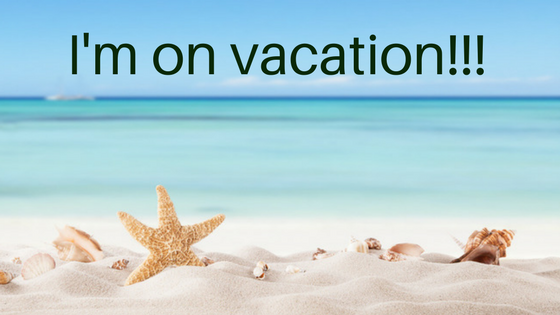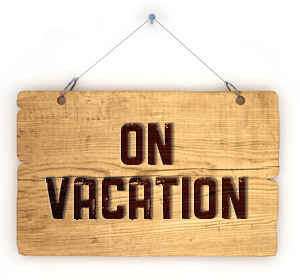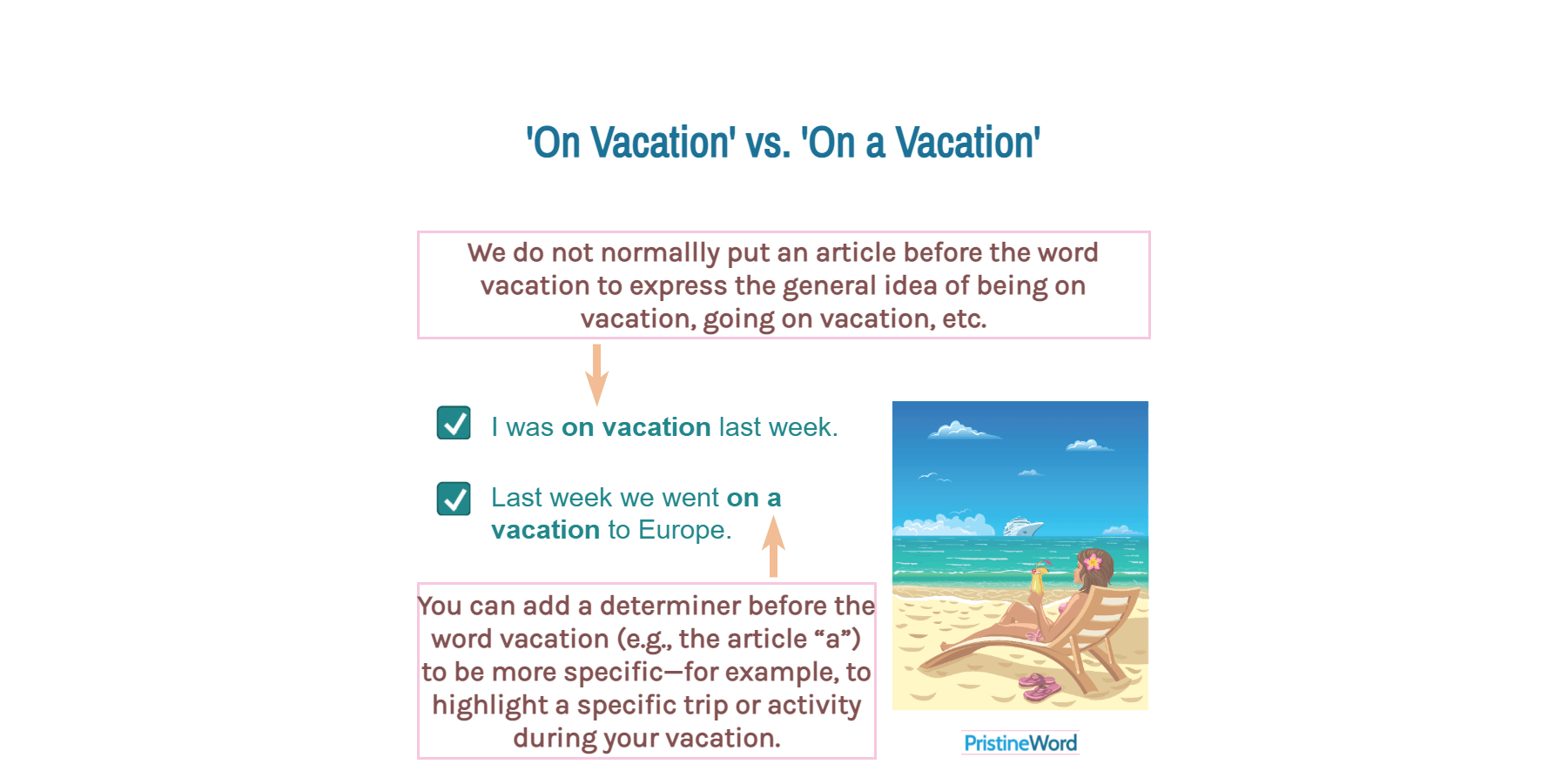Understanding the difference between “in vacation” and “on vacation” can be tricky. Both phrases seem correct, but which one should you use?
The phrase “on vacation” is the correct way to express that someone is taking a break from work or daily routines. “In vacation” is not commonly used in English. When we say someone is “on vacation,” it means they are away, relaxing, and enjoying their time off.
This distinction is important for clear communication, especially for non-native English speakers. In this blog post, we will explore why “on vacation” is the right choice and how to use it correctly in sentences. This will help you speak and write more accurately in English, making your conversations more effective.
Introduction To Vacation Terminology
Understanding vacation terminology can be challenging, especially for non-native speakers. Phrases like “in vacation” and “on vacation” often cause confusion. This guide aims to clarify these terms and their correct usage.
Common Confusion
Many people mix up “in vacation” and “on vacation.” The phrase “on vacation” is correct in most contexts. English speakers use “on vacation” to describe taking a break from work or daily routines.
For example, “I am on vacation” is the right way to say you are taking a break. Saying “I am in vacation” sounds awkward and incorrect. Understanding this difference helps in making sentences sound natural.
Importance Of Correct Usage
Using the correct term is important for clear communication. It helps others understand you easily. Using the wrong term might confuse your listeners or readers.
Correct usage also shows your proficiency in English. It reflects well on your language skills. This is especially important in professional settings or formal communications.
In Vacation Vs. On Vacation
Have you ever wondered whether you should say “in vacation” or “on vacation”? It’s a common question for many English learners. Both phrases might sound right, but only one is correct in standard English. Understanding the difference can help you communicate more clearly.
Differences Explained
“On vacation” is the correct phrase in standard English. People use it to describe their time away from work or daily routines. For example, “I am on vacation next week.” This phrase is widely accepted and understood.
“In vacation” is not correct in English. You may hear it from non-native speakers, but it’s not used by native speakers. Using “on vacation” will help you sound more natural and fluent.
Historical Context
The phrase “on vacation” has historical roots in the English language. It comes from the idea of being on a journey or trip. People used to say they were “on a voyage” or “on an excursion.” Over time, “on vacation” became the standard phrase.
The phrase “in vacation” does not have the same historical background. It may be a direct translation from other languages. In English, prepositions like “on” and “in” can change the meaning of a phrase. Using the right one is important for clear communication.
Usage In Different English Variants
English language usage can vary across different regions. This includes phrases like “in vacation” or “on vacation.” People in different English-speaking countries use these phrases differently. Understanding these differences can help in effective communication.
American English
In American English, people commonly use the phrase “on vacation.” For example, you might hear, “I am on vacation next week.” This indicates that someone is taking a break from work or daily routine.
British English
In British English, people often use the phrase “on holiday.” For instance, someone might say, “I am on holiday next week.” Here, “holiday” is synonymous with the American “vacation.”
While the phrase “in vacation” is less common in both variants, it sometimes appears in formal or academic contexts.
Grammar Rules For Prepositions
Understanding the rules for using prepositions can be tricky. Especially with phrases like “in vacation” or “on vacation”. Prepositions are small words like “in”, “on”, and “at”. They show the relationship between other words in a sentence. Using the wrong preposition can change the meaning of your sentence. Let’s look at the correct usage of “in” and “on” with the word “vacation”.
Prepositions With ‘in’
Using “in” with “vacation” is less common. It is usually incorrect. You might say “in the summer” or “in the morning”. Here, “in” shows a period of time. But you would not say “in vacation”. Instead, use “on vacation”.
Here are some correct uses of “in”:
- In the summer – Refers to the season.
- In the morning – Refers to the time of day.
- In the car – Refers to being inside a vehicle.
Prepositions With ‘on’
“On vacation” is the correct phrase. “On” shows a state or condition. For instance, you might say “on a boat” or “on the roof”. These examples show location or condition. Similarly, “on vacation” means you are in the state of taking a break.
Here are some correct uses of “on”:
- On a boat – Refers to being on the surface of the boat.
- On the roof – Refers to being on top of the roof.
- On vacation – Refers to being in the state of vacation.
Remember, use “in” for periods of time and “on” for states or conditions. This will help you speak and write correctly.
Contextual Usage Examples
Using “in vacation” and “on vacation” correctly can be confusing for some. These phrases often depend on the context they are used in. Below are examples showcasing their proper usage in different scenarios.
Formal Writing
Formal writing requires precision and clarity. Here are some examples of how to use “in vacation” and “on vacation” in formal contexts:
- On Vacation: “The CEO will be on vacation next week, so please address all urgent matters to the COO.”
- On Vacation: “Employees are encouraged to take their entitled leave on vacation to maintain work-life balance.”
- In Vacation: “The research team is currently in vacation mode, and regular updates will resume shortly.”
Casual Conversations
In casual conversations, the context might be more relaxed. Here are ways to naturally use these phrases:
- On Vacation: “I’m on vacation next week, planning to visit the beach.”
- On Vacation: “She is currently on vacation in Europe and will return on Monday.”
- In Vacation: “We are in vacation mode, just relaxing and having fun.”
Use these examples to better understand the context and enhance your writing and speaking skills.

Common Mistakes And How To Avoid Them
Many people make common mistakes in English phrases, especially with travel terms. “In vacation” and “on vacation” are often confused. Let’s explore these common errors and how to avoid them.
Misused Phrases
People often say “in vacation” instead of “on vacation.” This mistake happens frequently. “On vacation” is the correct phrase. It means you are enjoying a break. Incorrect usage can confuse readers or listeners.
Another common error is using “in holiday” instead of “on holiday.” The same rule applies here. Use “on holiday” to indicate you are taking a break. Small mistakes can impact your communication.
Correcting Errors
To avoid these errors, practice using the correct phrases. Remember, you are “on vacation” or “on holiday.” This small change makes a big difference. It helps you sound more fluent in English.
Read and listen to native speakers. Notice how they use these phrases. Practice speaking and writing them correctly. Over time, it will become natural.
Also, keep a list of common phrases. Review them regularly. This helps reinforce the correct usage in your mind. Making small efforts can improve your language skills greatly.
Tips For Remembering Correct Usage
Struggling to remember the correct usage between “in vacation” and “on vacation”? You’re not alone. Many people mix up these phrases. But don’t worry, there are simple ways to master this.
Mnemonic Devices
Using mnemonic devices can help you remember the right phrase. Think of the phrase “on vacation” as a journey. You go on a trip, just like you go on vacation. Picture yourself stepping onto a plane or a boat. This visual can make it easier to recall.
Another trick is to remember the phrase “on a break”. Just as you say “on a break”, you can say “on vacation”. Both phrases follow the same pattern. This similarity can help reinforce the correct usage in your mind.
Practice Exercises
Practice makes perfect. Create simple sentences using “on vacation”. For example, “She is on vacation in Spain.” Write down a few sentences each day. This will make the correct usage second nature.
Try speaking these sentences out loud. Hearing the phrase can strengthen your memory. You can also quiz yourself. Write down both phrases and circle the correct one. This exercise will help you distinguish between the two.
Engage in conversations with friends or family. Use “on vacation” correctly in your sentences. Practicing in real-life situations will boost your confidence and accuracy.

Impact Of Correct Usage On Communication
Correct usage of phrases like “in vacation” or “on vacation” can impact communication. It ensures clarity and precision in conversations. Misuse of these phrases can lead to misunderstandings. This is crucial in both professional settings and everyday interactions.
Professional Settings
In professional settings, using “on vacation” is more common and accepted. It conveys the message that someone is taking time off work. Saying “in vacation” might confuse colleagues. They may not understand the intended message. Clear communication helps maintain professionalism. It ensures that everyone understands schedules and availability. Precise language can also reflect positively on one’s professional image.
Everyday Interactions
In everyday interactions, the correct usage of “on vacation” also matters. Friends and family will understand your plans better. Misunderstandings can lead to confusion about your whereabouts. For example, saying “I am on vacation” clearly states you are away. It avoids any misinterpretation about your location or activities. Clear communication in casual conversations is as important as in professional ones. It fosters better relationships and mutual understanding.

Frequently Asked Questions
How Do I Write “i Am On Vacation”?
Write “I am on vacation” to inform others about your break. This phrase clearly communicates your unavailability.
What Is The Meaning Of On Vacation?
On vacation means taking a break from work or daily routines to relax and travel. It involves leisure activities and time off.
Is It Going On Vacation Or For Vacation?
Use “going on vacation” when referring to taking a trip. “For vacation” is less common but still correct.
What Is In A Vacation?
A vacation includes travel, relaxation, new experiences, and activities. It offers a break from daily routine and work.
Conclusion
Choosing between “in vacation” or “on vacation” can be confusing. Remember, “on vacation” is correct. This phrase is used in both American and British English. Using the right preposition makes your communication clear. So, next time you talk about your trip, say “on vacation.
” It sounds natural and correct. Happy travels and enjoy your time off!



